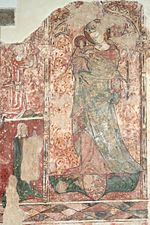Lullay, mine liking facts for kids

"Lullay, mine liking" is a very old English poem or song from the 1400s. It tells a story about the birth of Jesus and includes a special song sung by the Virgin Mary to baby Jesus. This song is an early example of what we now call a lullaby. The word "lullaby" might come from the "lu lu" or "la la" sounds parents make to calm babies, combined with "by" or "bye bye."
This poem is one of the most famous old English lullabies about the birth of Jesus. No one knows who wrote it. The only copy of the text is found in a collection of old poems called the Sloane Manuscript 2593. This important book is kept safe at the British Library.
Even though "Lullay, mine liking" was meant to be sung, we don't have any of its original music. But since it was rediscovered, many modern composers have created new music for it. Some of these composers include Philip Stopford, Edgar Pettman, Peter Warlock, R. R. Terry, Gustav Holst, Ronald Corp, David Willcocks, Philip Lawson, Alan Spedding, and Richard Rodney Bennett.
Sometimes, this carol is called "I saw a fair maiden." Other times, like in versions by R.R. Terry and Ronald Corp, it's known as "Myn Lyking."
The Poem's Words
The poem "Lullay, mine liking" was written in Middle English. This was the language spoken in England between the 11th and 15th centuries. It's different from the English we speak today. Below, you can see the original Middle English words, a slightly updated Middle English version, and what the poem means in modern English.
| Original Middle English | Slightly Updated Middle English | Modern English Meaning |
|---|---|---|
| Refrain Lullay, myn lykyng, my dere sone, myn swetyng, |
Refrain |
Refrain |
|
I saw a fayr maydyn syttyn and synge, |
I saw a fair maiden, sitten and singe, |
I saw a fair maiden, sitting and singing, |
|
That eche lord is that that made alle thinge, |
That eche lord is that that made alle thinge; |
That very lord is He who made all things; |
|
Ther was mekyl melody at that chyldes berthe, |
There was mekel melody at that childes berthe; |
There was much melody at that Child's birth; |
|
Aungelebryt thei song that nyt and seydyn to that chyld, |
Aungele bright they song that night, and seiden to that child, |
Bright angels sang that night and said to that Child, |
|
Prey we now to that chyld, and to his moder dere, |
Prey we now to that child, and to his moder dere, |
Let us pray now to that Child, and to His dear mother, |
 | Toni Morrison |
 | Barack Obama |
 | Martin Luther King Jr. |
 | Ralph Bunche |

